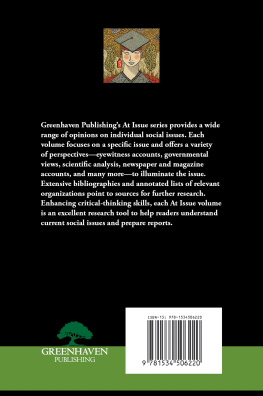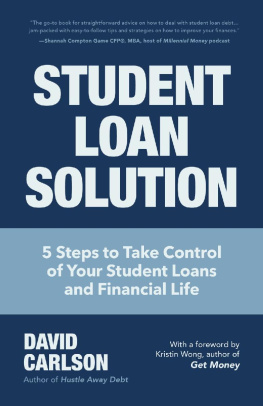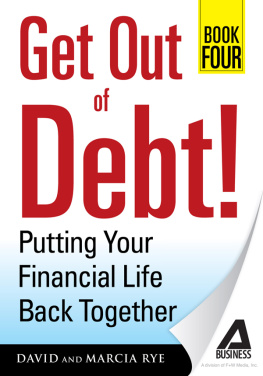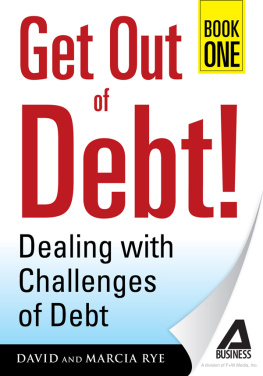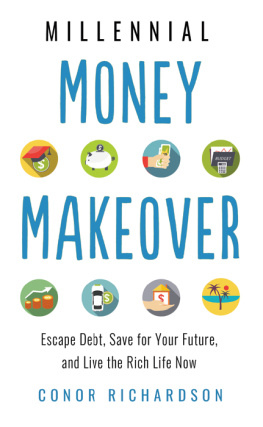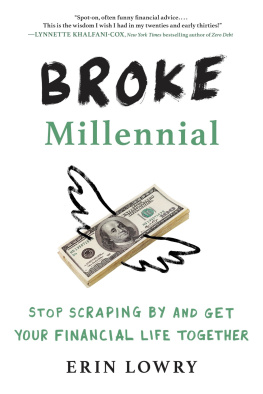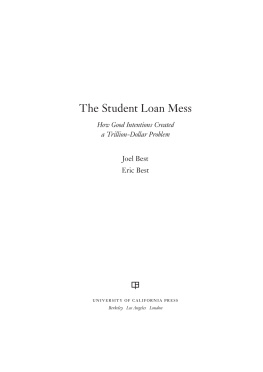The Millennial Money Fix by Douglas and Heather Boneparth provides a fiscal roadmap for todays largest generation, Millennials. The book offers multiple lessons in financial literacy, which will be eye-opening for some readers but are necessary for all young people to know.
Leah Ingram, author,
The Complete Guide to Paying for College
The Millennial Money Fix highlights two of todays concerns, the higher education bubble and the changing job market. Douglas and Heather Boneparth accurately describe the higher education bubble and the coming changes in the job market in a pragmatic way most people havent read. The Boneparths then give their readers reliable solutions to address these problems and, ultimately, achieve financial freedom.
Debt Free Guys, money bloggers and authors,
4: The Four Principles of a Debt Free Life

Copyright 2017
by Douglas A. Boneparth and Heather J. Boneparth
All rights reserved under the Pan-American and International Copyright Conventions. This book may not be reproduced, in whole or in part, in any form or by any means electronic or mechanical, including photocopying, recording, or by any information storage and retrieval system now known or hereafter invented, without written permission from the publisher, The Career Press.
THE MILLENIAL MONEY FIX
EDITED BY ROGER SHEETY
TYPESET BY KARA KUMPEL
Cover design by Jonathan Bush Design
Benjamin Franklin image by Galushko Sergey/shutterstock
Printed in the U.S.A.
To order this title, please call toll-free 1-800-CAREER-1 (NJ and Canada: 201-848-0310) to order using VISA or MasterCard, or for further information on books from Career Press.

The Career Press, Inc.
12 Parish Drive
Wayne, NJ 07470
www.careerpress.com
Library of Congress Cataloging-in-Publication Data
CIP Data Available Upon Request.
To Hazel, our Greatest Thing in Life.
CONTENTS
CHAPTER ONE
THE MILLENNIAL PROBLEM
The year was 2003, a time when 50 Cent and the Ying Yang Twins ruled the Billboard charts. The place was Gainesville, Florida, a town where college dreams are made. Well, mine were at least. I showed up early to take summer classes and get a taste of independence. It was absolutely amazing. I could do whatever I wantedassuming I made passing grades and didnt get arrested. My first act of freedom brought me to the tattoo shop downtown, where I paid actual money to have a silver loop stapled into my left eyebrow. Rebellious, right? In all fairness, face jewels were marginally cool back then. And I ripped the thing out after just four days, when it started to itch.
Independence is one hell of a drug.
My four years at Florida were a dream, so great at times they did not seem real. Raised to have what our parents would call a good head on my shoulders, I was a good boy. I made good (enough) decisions, which led to my first hints of the Great Things in Life. I witnessed three national championships from the Gator football and basketball teams, made lifelong friends through my fraternity, received an early start on the career I love, andmost important of allmet my wife, Heather. It all plays back in my head like a slow montage to the tune of (Ive Had) The Time of My Life. Sigh.
But as the eyebrow ring suggested, I was also a bit young and stupid. Even with a financial advisor as a father and an internship working in his practice, I was not mature enough to make the right decisions all the time. For one, I dropped out of the business school to pursue an easier degree in public relations, just because I didnt feel like taking financial accounting. I heard it was hard. I borrowed student loans from a private lender for my rather small tuition payments. (Why didnt Dad stop me? I dont know.) And I dumped a disproportionate amount of cash into spiffing up and tricking out my 2004 Subaru Impreza WRX. Its startling how much money a cat-less exhaust system, sport springs, an STI bookshelf spoiler, 17-inch gunmetal Prodrive 10-spoke rims, painted side skirts, and a custom front mesh grill could cost. Not to mention my weekly trips to the local dent specialist at 20 bucks a pop. The Campus Lodge parking lot was treacherous for my baby.
In a sense, each one of these gaffes stemmed from my lack of financial literacy, and with some basic calculations, I could have done better. Even when my choices were poor judgment calls rather than outright mistakes, if I had been equipped with more knowledge, maybe I would have chosen better. And my decisions had little consequences. Othersincluding Heatherscould affect the rest of your life.
WE ARE FINANCIALLY ILLITERATE
The financial issues of all living generations are cut from the same bedrock: a lack of financial literacy. When asked questions about their retirement in a 2014 survey by The American College of Financial Services, only 20 percent of retirement-age adults received a passing score.
Theres more statistics to go around, but you get the gist: no age group knows it all when it comes to financial wellness. We could all use some work. Hell, if my dad was not a financial advisor who engrained personal finance in my brain, I would be just as bad. Put aside the coursework I took to become a financial advisor myself and not a single class in two decades of schooling would have provided me the tools to make informed financial decisions. I never received a proper lesson on cash flow, debt management, credit, or investments. And without understanding these topics, we only learn lessons by reacting to our lives choppy waterscorrecting the mistakes that weve already made.
Without question, Millennials need to learn even more because our financial landscapes are more complicated today than those of our parents and theirs. In fact, we may be even less knowledgeable than our elders because coming of age this century hasnt required the same level of vigilance to assure our survival.
Or maybe thats just what we assumed.
The Greatest Generation was great for a reason. They worked incredibly hard so their children and grandchildren could live better lives. Many were immigrants, escaping religious, political, and ethnic persecution. As if that wasnt enough, they lived through the Great Depression. They overcame historical obstacles and made the kinds of sacrifices I hope we never have to. I admire their legacyincluding that of my grandfather, a true World War II heromore than words can state here. But these difficult experiences shaped their financial behaviors. I used to joke about my grandparents hiding money under their mattresses, but the fear wasnt funny to them.
When it came to managing their finances, their caution cut both ways. Their well-founded worry that everything could be taken away from them in an instant drove them toward prudent decision-making skills. The mantra was that you didnt spend more than you had, and if you had to borrow, you paid it back as soon as you could. They had a healthy dose of skepticism, but you cant blame them, given what they had witnessed.
At the same time, fear from their experiences may have limited how far some members of the Greatest Generation felt they could reach. But pairing a relatively less complex economy with their cautious approach to personal finance helped them build conservative and stable lives for their families.
They gave birth to the Baby Boomers, or as I see them, our parents. Mom and Dad were more optimistic than their parents, perhaps too much so. Like our grandparents, they were not immune to the effects of conflict. For many, the Vietnam War sent childhood friends to fight for freedom once again, and the Cold War reminded everyone that technology could be as terrifying as it could be exciting. The Civil Rights Movement further fanned the flames during an already tumultuous time.
Next page

